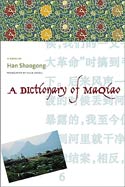 A Dictionary of Maqiao
A Dictionary of Maqiao
Maqiao, a fictitious rural village lost in the vitals of Mao's Communist empire, is to Han's magical novel what Macondo is to One Hundred Years of Solitude—a place in which the various brutalities and advances of contemporary history are transformed within the "fossil seams" of popular myth. Han adopts the rules of the dictionary to the rules of fiction, distributing mini-sagas of rural bandits, Daoist madmen and mixed up Maoists across the definitions of terms with special meaning in Maqiao. Han, narrator as well as author, is sent to Maqiao as part of a cadre of "Educated Youth" during the Cultural Revolution. A sharp, sophisticated observer, he narrates these folkloric tales from the vantage point of contemporary China, situating them within a richly informative historical and philosophical framework.
Among the stories that deserve mention are those of Wanyu, the village's best singer and reputed Don Juan, who is discovered to lack the male "dragon"; of "poisonous" Yanzao, so called both because his aged mother has a reputation as a poisoner and because he is assigned to spread pesticides (and in so doing absorbs such a quantity of toxins that mosquitoes die upon contact with him); and of Tiexiang, the adulterous wife of Party Secretary Benyi, who takes up with Three Ears, so called because of the rudimentary third ear that grows under one of his armpits. Flawlessly translated by Lovell, this novel should not be missed by lovers of literature.
The book received very positive Amazon.com reader reviews.
 A Dictionary of Maqiao
A Dictionary of Maqiao

No comments:
Post a Comment